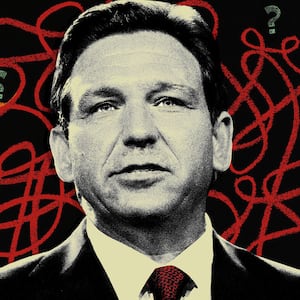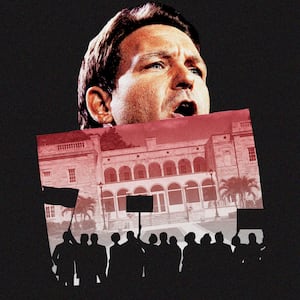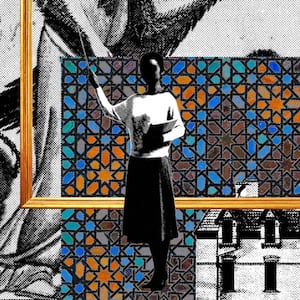Dr. Samuel Joeckel’s 20-year English professorship at Palm Beach Atlantic University (PBAU) currently hangs in the balance. It took just a phone call from a student’s parent—displeased with what their child was learning during the racial justice unit in Joeckel's Composition II class—to imperil his long career at the private Christian college in Florida.
As Joeckel described to The Daily Beast, he left his classroom on Feb. 15 to find the school’s provost and dean waiting outside the door. The three stepped back into the room where the administrators informed him that, pending a review of the material used in the racial justice unit, his contract renewal was delayed to mid-March due to a student’s parent accusing him of “indoctrinating students.”
In the days that followed, Joeckel described this interaction in an Instagram post and went public with his concern that he “may very well be fired”—a rational fear, considering that, according to PBAU employee resources, the school does not offer tenure and its faculty face the ever-present threat of contract nonrenewal.
When reached for comment, a university spokesperson told The Daily Beast that PBAU “is not commenting on this matter at the time.” But an internal memo obtained by the Palm Beach Post suggests that the university is standing by its actions. In it, the provost noted that “it is important that the Composition II objectives remain the focus of [Joeckel’s] course”—such objectives being to establish students' “[i]ntermediate expository and argumentative prose” and to work on “analytical reading skills” and “applying the rules and conventions of English prose.”
Joeckel provided The Daily Beast with a copy of the Composition II syllabus and a list of material typically featured in the racial justice unit—neither of which suggest that he has strayed from such course objectives.
The list of racial justice readings Joeckel shared contains—among other historical texts by Frederick Douglass, Booker T. Washington, and W.E.B. du Bois—Martin Luther King Jr.’s “Letter from Birmingham Jail,” a canonical and much-anthologized work within English composition studies, and Malcolm X’s “Ballot or the Bullet” speech, another standard in college-level English rhetoric courses. It also includes works by contemporary writers on race such as Jemar Tisby, Ijeoma Oluo, George Yancy, William Glaude, Jr., and Ibram Kendi—the latter of whose work has proven to be a fixation among right-wing book-banners as of late.
Joeckel emphasized that his students “are not told what to think about these materials; they come to their own conclusions.”
And it certainly seems that, in assigning them, he was was acting well within his “right to decide what to teach”—a right purportedly protected under PBAU’s academic freedom policy—which he had previously exercised for over a decade in teaching his racial justice unit, without a “PBA administrator voic[ing] any concern” about his curriculum or pedagogy, he noted.
Notably, too, Joeckel’s students have the right to learn (also enshrined in PBAU’s academic freedom policy), which must not be able to be infringed upon by a classmate’s helicopter parent. After all, these students are not—as the parent’s charge of “indoctrination” and the university’s accommodation thereof insultingly presuppose—sponges passively absorbing information, but undergraduates capable of critical thought, who enrolled in Joeckel’s course voluntarily (something which can’t be said about PBAU students’ mandatory chapel attendance).
In coming to his defense on social media and through an online petition—which has garnered over 1,500 signatures, including many from his former students—Joeckel’s students have resoundingly dispelled the notion that he imposes his ideas in the classroom.
In one comment on the petition, a signatory and former student called the accusation of indoctrination laughable, recalling that Joeckel always “refrained from giving his personal stances” and “let the texts speak for themselves.” In an email to The Daily Beast, Adriana Bøckman-Pedersen, another former student who signed the petition, praised Joeckel’s ability to “facilitate open discussions and encourage students to think critically” and counted him as among the few PBAU professors who fostered a classroom environment in which she felt comfortable.
The readiness with which PBAU heeded the parent’s complaint can be explained, in part, by the fact that the university has recently been fostering a more partisan right-wing image, according to some observers. The school made some headlines in 2020, for example, for its decision to select then-first lady Melania Trump as its “Woman of Distinction” for the year. Concurring that the school “has turned much farther to the right” over the last three or four years, Joeckel attributed his situation to an “anti-woke political ideology that is infiltrating the campus.”

Palm Beach Atlantic University.
Ccasey11/Wikimedia CommonsAnd it's impossible to brush off this development’s concurrence with Florida Gov. Ron DeSantis’ ongoing neo-McCarthyite campaign against so-called “woke indoctrination” in public universities as pure coincidence. DeSantis’ crusade has consisted of proposals described in these pages by PEN America’s Jeremy C. Young as “the most draconian restrictions on public higher education institutions in the United States.”
When asked about the parallels between PBAU’s actions and DeSantis’ public higher education overhaul, Joeckel pointed to his many years teaching the racial justice unit without issue: “Why didn’t they come to me five years ago? Why didn’t they come to me with concerns 10 years ago? Why is it now? And, you know, I think your answer is obvious.” (Making this connection even more unsubtle, the dean cut off Joeckel’s impromptu Feb. 15 meeting to welcome the governor on campus for a speaking event).
Considering that faculty and students at PBA—as well as national free expression organizations like PEN America and FIRE—have denounced the university’s actions and rallied behind Joeckel, one can hope that public pressure can sway the minds of the administration.
Either way, the case has dire implications for all PBAU faculty—Joeckel told The Daily Beast that he believes “there are other professors on this campus who…fear for their own academic freedom,” particularly those who teach “controversial and provocative” subjects. “And I think they’re wondering, maybe I shouldn’t teach that any more.”
And so, since affairs like this inevitably chill academic freedom, significant harm may have already been done regardless of the outcome. Worse, broader efforts to censor classroom discussions on race across campuses in Florida—and the nation—suggest there is much more to come.










